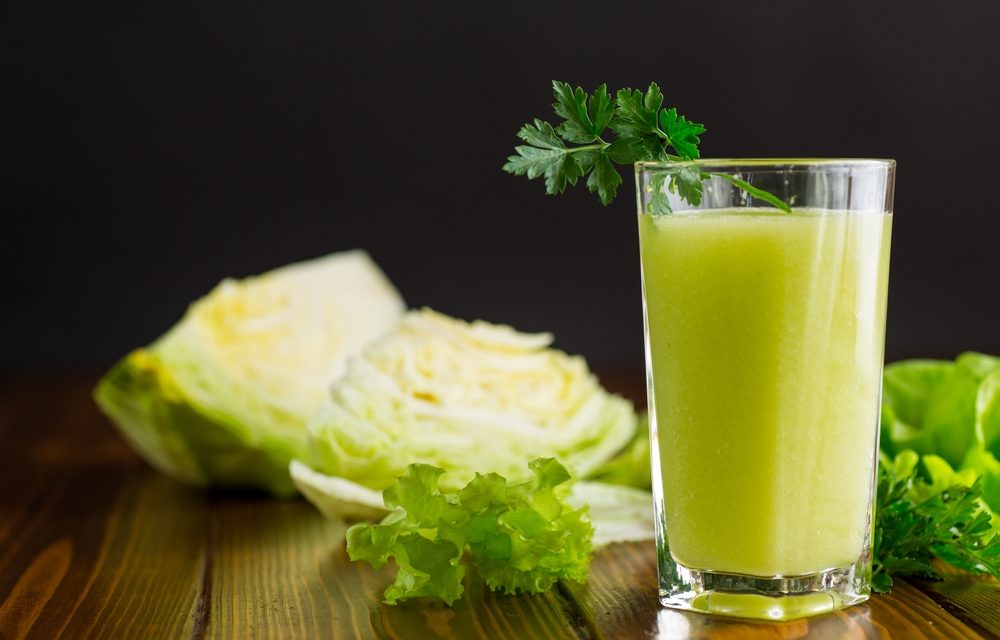Cabbage Juice Can Heal the Mucosa
Cabbage juice may sound like a folk remedy, but its benefits are supported by decades of research.
Studies dating back to the 1940s and 1950s found that fresh cabbage juice can help heal peptic ulcers, and modern science continues to explore how its active compound—S-methylmethionine, sometimes called “vitamin U”—supports gut health and mucosal repair.
What Is “Vitamin U”?
Vitamin U isn’t actually a vitamin. It’s a derivative of the amino acid methionine, naturally found in cabbage and other cruciferous vegetables.
S-methylmethionine appears to protect the lining of the stomach and intestines, enhance mucosal healing, and may also have antioxidant and liver-protective effects.
Beyond ulcers, emerging evidence suggests vitamin U may:
-
Support recovery from acid reflux, gastritis, and ulcerative colitis
-
Protect the liver from damage caused by toxins or acetaminophen
-
Help reduce allergic sensitivity and inflammation
-
Support detoxification and healthy cholesterol metabolism
Classic Ulcer Research
The earliest studies were done by Dr. Garnett Cheney at Stanford in the late 1940s and early 1950s.
In one double-blind, placebo-controlled trial at San Quentin Prison, patients with x-ray-confirmed peptic ulcers were treated with concentrated cabbage juice. Within an average of 22 days, the ulcer craters had healed in most of the cabbage-juice group, while the placebo group showed little improvement [1, 3].
Cheney published a series of papers demonstrating that cabbage juice accelerated ulcer healing severalfold faster than standard therapy at the time.
Modern Research
Although the early “vitamin U” studies pre-date modern clinical standards, later research supports similar mechanisms:
-
Methionine derivatives help protect colon cells from sulphide damage, suggesting benefit for ulcerative colitis [4].
-
Sulphydryl-containing compounds, including S-methylmethionine, have been shown to stimulate ulcer healing [5, 6].
-
A double-blind randomized trial confirmed that sulphydryl agents play a key role in protecting against and managing recurrent ulcerative colitis [8].
-
More recent studies in both animals and humans show that vitamin U analogs can reduce inflammation and enhance mucosal regeneration [7].
How It’s Used
Traditionally, practitioners recommended ½ cup of fresh raw cabbage juice several times daily for peptic or gastric ulcers.Some modern supplement formulas provide S-methylmethionine tablets or powders. Cabbage juice is inexpensive, safe for most people, and can be part of a broader healing diet focused on gut restoration and anti-inflammatory foods.
FAQ
Q: Can cabbage juice really help heal ulcers?
Early research and patient reports suggest that cabbage juice, rich in S-methylmethionine (“vitamin U”), may support healing of stomach and intestinal ulcers by protecting and repairing the mucosal lining.
Q: How much cabbage juice should you drink?
Traditional use was about ½ cup of fresh raw cabbage juice, two to three times daily, between meals. It’s best used as part of a balanced diet rather than a stand-alone treatment.
Q: Is cabbage juice good for acid reflux or ulcerative colitis?
Yes—studies indicate cabbage’s sulfur compounds and antioxidants may help reduce irritation and promote tissue healing in these conditions. It’s not a cure, but can support digestive recovery.
Q: Can you get the same benefits from cooked cabbage?
Cooking destroys much of the active compound “vitamin U,” so raw juice or supplements are preferred if you’re targeting ulcer healing.
References:
- (Calif Med. 1956 Jan;84(1):39-42) Vitamin U therapy of peptic ulcer; experience at San Quentin Prison
- “Anti-peptic ulcer dietary factor (vitamin “U”) in the treatment of peptic ulcer”. J Am Diet Assoc. 26 (9): 668–72.
- Rapid healing of peptic ulcers in patients receiving fresh cabbage juice. CHENEY G.Calif Med. 1949 Jan;70(1):10-5.PMID: 18104715
- Gut. 1996 Jul;39(1):77-81 Methionine derivatives diminish sulphide damage to colonocytes–implications for ulcerative colitis
- 1992;45(3):170-80. Sulphydryl-containing agents stimulate the healing of duodenal ulceration in man
- Can J Surg. 1993 Feb;36(1):53-8. Sulfhydryl-containing agents in the treatment of gastric bleeding induced by nonsteroidal anti-inflammatory drugs
- Vopr Pitan. 2018;87(5):70-76. [S-methylmethionin (vitamin U): experimental studies and clinical perspective]
- 1992;45(6):307-18. Role of sulphydryl-containing agents in the management of recurrent attacks of ulcerative colitis.








